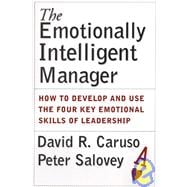
Note: Supplemental materials are not guaranteed with Rental or Used book purchases.
Purchase Benefits
Looking to rent a book? Rent The Emotionally Intelligent Manager How to Develop and Use the Four Key Emotional Skills of Leadership [ISBN: 9780787970710] for the semester, quarter, and short term or search our site for other textbooks by Caruso, David R.; Salovey, Peter. Renting a textbook can save you up to 90% from the cost of buying.
The Chris Argyris Professor of Psychology at Yale University, Peter Salovey published the first scientific articles on emotional intelligence (with John D. Mayer), introducing the concept to the field of psychology. Salovey also serves as dean of Yale's Graduate School of Arts and Sciences and has additional faculty appointments in the School of Management and the Department of Epidemiology and Public Health. He is currently president of the Society for General Psychology. A leading authority on the psychological consequences of mood and emotion as well as on health communication, he is widely quoted in print and broadcast media. Salovey was founding editor of the Review of General Psychology and served as an associate editor of the APA journals Emotion and Psychological Bulletin.
|
|||
|
|||
|
|||
|
|||
|
|||
|
|||
|
|||
|
|||
|
|||
|
|||
|
|||
|
|||
|
|||
|
|||
|
|||
|
|||
|
|||
|
|||
|
|||
|
|||
|
|||
|
|||
|
|||
|
|||
|
|||
|
The New copy of this book will include any supplemental materials advertised. Please check the title of the book to determine if it should include any access cards, study guides, lab manuals, CDs, etc.
The Used, Rental and eBook copies of this book are not guaranteed to include any supplemental materials. Typically, only the book itself is included. This is true even if the title states it includes any access cards, study guides, lab manuals, CDs, etc.